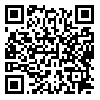Volume 36, Issue 146 (March 2024)
IJN 2024, 36(146): 590-603 |
Back to browse issues page
Download citation:
BibTeX | RIS | EndNote | Medlars | ProCite | Reference Manager | RefWorks
Send citation to:



BibTeX | RIS | EndNote | Medlars | ProCite | Reference Manager | RefWorks
Send citation to:
Bahreinizadeh A, Adel Mehraban M, Haghani H. COVID-19-Related Anxiety and Its Relationship With Job Burnout in Health Workers From Bushehr Province, Southern Iran. IJN 2024; 36 (146) :590-603
URL: http://ijn.iums.ac.ir/article-1-3765-en.html
URL: http://ijn.iums.ac.ir/article-1-3765-en.html
1- Department of Community-Based Education in Health, School of Nursing and Midwifery, Iran University of Medical Sciences, Tehran, Iran.
2- Department of Nursing Management, Nursing and Midwifery Care Research Center, Health Management Research Institute, School of Nursing and Midwifery, Iran University of Medical Sciences, Tehran, Iran. ,adel.m@iums.ac.ir
3- Department of Biostatistics, School of Sciences Health, Sciences Medical of University Iran, Tehran, Iran.
2- Department of Nursing Management, Nursing and Midwifery Care Research Center, Health Management Research Institute, School of Nursing and Midwifery, Iran University of Medical Sciences, Tehran, Iran. ,
3- Department of Biostatistics, School of Sciences Health, Sciences Medical of University Iran, Tehran, Iran.
Abstract: (2140 Views)
Background & Aims Health workers during the COVID-19 pandemic had high responsibilities of prevention and treatment, which can cause anxiety in them considering the negative effects of the pandemic on mental health. This study aims to investigate the COVID-19-related anxiety level and its relationship with job burnout in health workers from Bushehr province, southern Iran.
Materials & Methods This is a descriptive-correlational study with a cross-sectional design that was conducted in 2022. Participants were 365 health workers from health centers affiliated to Bushehr University of Medical Sciences, who were selected by census method. The data was collected using a sociodemographic form, the Maslach Burnout Inventory, and the corona virus anxiety scale. SPSS software, version 16 was used for data analysis.
Results Of 365 health workers, 308 completed the questionnaires. The majority of thm were female (69.5%) and married (85.7%). Their mean age and work experience were 37.8 and 13.9 years, respectively. The anxiety in most health workers (70.8%) was mild (Mean: 12.58 ±10.81). The findings also showed that 31.8% had moderate to severe emotional exhaustion; depersonalization was mostly low (82.1%), and about half had low personal achievement (49.7%). There was a significant relationship between COVID-19-related anxiety and emotional exhaustion (r=0.667; P<0.001), depersonalization (r=0.472, P<0.001), and personal achievement (r=-0.188, P=0.001).
Conclusion There is a significant relationship between anxiety caused by COVID-19 and job burnout in health workers. Although the pandemic did not cause high anxiety among health workers in Bushehr province, it can disrupt their performance. Policymakers in Iran should pay more attention to the negative effects of pandemics on health workers.
Materials & Methods This is a descriptive-correlational study with a cross-sectional design that was conducted in 2022. Participants were 365 health workers from health centers affiliated to Bushehr University of Medical Sciences, who were selected by census method. The data was collected using a sociodemographic form, the Maslach Burnout Inventory, and the corona virus anxiety scale. SPSS software, version 16 was used for data analysis.
Results Of 365 health workers, 308 completed the questionnaires. The majority of thm were female (69.5%) and married (85.7%). Their mean age and work experience were 37.8 and 13.9 years, respectively. The anxiety in most health workers (70.8%) was mild (Mean: 12.58 ±10.81). The findings also showed that 31.8% had moderate to severe emotional exhaustion; depersonalization was mostly low (82.1%), and about half had low personal achievement (49.7%). There was a significant relationship between COVID-19-related anxiety and emotional exhaustion (r=0.667; P<0.001), depersonalization (r=0.472, P<0.001), and personal achievement (r=-0.188, P=0.001).
Conclusion There is a significant relationship between anxiety caused by COVID-19 and job burnout in health workers. Although the pandemic did not cause high anxiety among health workers in Bushehr province, it can disrupt their performance. Policymakers in Iran should pay more attention to the negative effects of pandemics on health workers.
Type of Study: Research |
Subject:
nursing
Received: 2023/11/4 | Accepted: 2023/05/22 | Published: 2024/03/1
Received: 2023/11/4 | Accepted: 2023/05/22 | Published: 2024/03/1
Send email to the article author
| Rights and permissions | |
 |
This work is licensed under a Creative Commons Attribution-NonCommercial 4.0 International License. |







